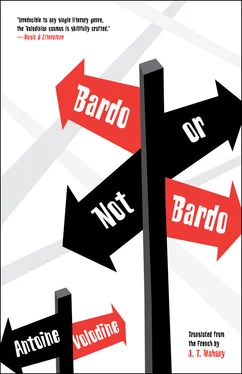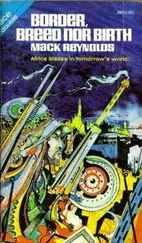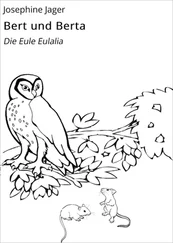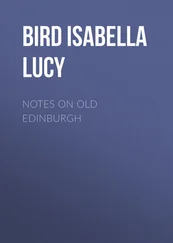“Stop, Freek,” the bartender says. “You’re like us, like everyone. Half human, half animal. Everyone’s the same way. You, me. . I can’t guarantee I’m a hundred percent human either. I just don’t know.”
“All the same. No one accidentally throws you in cages, I take it? With hippopotamuses and parrots?”
“Oh, I. . I was locked up in a special prison for twenty-five years. . With men and women who’d shot soldiers, ministers. .”
“Who did you shoot, Yasar?”
“Gangsters.”
Yasar was immersed in a hard silence. He’d killed mafiosos, in the past, but only a small number of them, and the species still hadn’t disappeared. To the contrary, it had multiplied, reducing other species’ territories, polluting other species’ daily lives and even their dreams. Yasar floats wordlessly, momentarily in the depths of this failure. The others, Freek and the whiskey drinker, ruminate on what they have said or heard.
A truck rumbles on the boulevard. The windows, and even a few glasses on the shelf behind Yasar, vibrate.
Behind the wall ascend mantras, prayers.
In the radio’s disappointing loudspeaker, barely audible since Yasar lowered the sound for reasons unknown, the Korean singer expresses the pain of desertion, the pain of scorned fidelity, the pain of betrayed filial devotion. She has taken on a quavering, but powerful, intonation. It is possible that its unbearable beauty is why the bartender, without thinking, changed the volume.
The small man sitting behind Freek swallows the last mouthful of his first glass.
“You work at the zoo?” he suddenly asks Freek.
Freek turns toward him. His heart always races when a stranger talks to him. Any sort of direct question agonizes him, he feels like trouble must follow. He fears what humans may think, not necessarily their actual threats, but what they might imagine, their cruel and shameful daydreams, often unconfessed, their unconscious depictions of his suffering or death. He pivots frankly toward the stranger and tries to answer naturally, but he can’t hide the abrupt pallor of his cheeks, nor the nervous quivering of his eyelids, his lips.
“Yes,” he says. “I go to the zoo. I get in through openings in the bars. When the visitors are gone, I talk to the animals. They’d like to be somewhere else. They’d like not to have to die in order to be somewhere else. They shiver in a corner for hours, without stopping. I wait for dusk, I sit near them and speak to them. The animals listen to me. They listen all night through the night, with their ears and muzzles. I try to talk to them until their fear fades away.”
The small, worn-out man stirs the ice cubes in his empty glass, then puts it back down in front of him.
“It’s not just animals,” he says. “I’m in a funk myself. Once you’re aware you’re trapped in life without any way to get out. . And then, when you think about those who did get out. . When you imagine what happens to them after. . At this very moment, for example. .”
He attacks his second double whiskey.
“And do you know how to get rid of humans’ fears?” he continues.
“No,” says Freek. “Not humans. For that, you have to go to a lama.”
He clears his throat. He successfully talked with the stranger, but the effort hurt his vocal cords. Now he figures he can end the dialogue without offending the other man. He turns toward Yasar, toward the shelves lined with multicolored bottles.
“Can you make me another caffeine, Yasar?” he says. “I’m going to drink one more bowl and then go. The animals are miserable. It’ll be a difficult night for them. I have to leave. They’re whining in the darkness, they’re waiting for me. They’re going to need me. They’re terrorized by death. Like the yak. Like the clown.”
“Hey!” exclaims the Sunday-dressed proletarian. “How did you know I’m a clown?”
He lifts his arm, an arm with a too-long sleeve, in the half-theatrical gesture of a man who has been drinking.
“Oh, you’re a clown?” asks Freek.
“Yes,” says the man.
He puts his hand back on the table.
Yasar is once again busying himself with the percolator.
A lama’s indecipherable voice wends through the air vent.
“I went to the circus the other day,” Freek says. “There were two clowns, Blumschi and Grümscher. One small and one big. They blindly greeted each other from different ends of the floor. Then they ran at each other, they crossed paths but didn’t touch. They often fell down.”
He pauses to thank Yasar, who’s given him a piping black bowl. He leans over it, he breathes. He skims the liquid with his lips to test the temperature. He doesn’t risk inhaling it in. He breathes again so that the temperature will drop. It doesn’t drop.
“When the big one fell down,” continues Freek, “the little one would stop running and rush to help him get back up, but it didn’t work. The big one struggled and shouted. It was very funny. He struggled, he refused the little one’s help, and he fell back down. It was very comical. But no one laughed, except me. One of the two is dead. I heard some watchmen say he killed himself. He must have been part of a lamaist group. His body was given to the vultures earlier, to the condors, the eagles. Sky burials, they’re called. They go into the raptor cage and throw pieces of the body at them. I didn’t get near. I was busy talking to the yak. I couldn’t see if it was the little one or the big one.”
“It was the big one,” says the man as he takes a drink of alcohol. “It was Big Grümscher.”
“You’re sure?” Yasar asks, leaning on the counter.
“Why would I lie to you?” says the man as he swallows another mouthful. “I’m Blumschi, his partner. We worked together at the Schmühl Circus. You must have seen the posters, Schmühl himself put them up in noticeable places, near stoplights, at the entrances to parking lots. Posters with our names on them. Big Grümscher and Little Blumschi, the kings of laughter.”
He drinks.
“The kings of laughter,” he repeats. “Inseparable. Together forever. More than partners, actually. Much more. Inseparable brothers. And now. . Now, like the dead once they’ve passed to the other side, I must go on alone. It’s so frightening. . going alone. . So painful. . Grümscher! Can you hear me, Grümscher? How am I going to do it now, all alone, with an unlaughing audience?”
A sob rattles him from head to toe.
“Grümscher!” he says.
“You’re a weepy drunk,” Yasar observes.
“Not really,” says the clown.
“You probably shouldn’t finish your second glass,” Yasar insists.
“I’m drinking to Grümscher’s health,” explains Blumschi. “In the temple, they’re reading him the Book of the Dead , right now. Shaven-skulled bonzes. They do that. And I’m drinking in memory of Big Grümscher.”
“It’s helpful to read the Book of the Dead ,” Freek intervenes. “Where he is, he’s really very alone. He needs someone to reassure him and tell him what to do. You know, if he can hear a voice, even if he can’t understand it, he’ll feel relieved. He’ll be less afraid. Even if it’s not true, it’ll give him the feeling he’s not entirely alone. You should speak to him, instead of drowning yourself in whiskey.”
“What do you want me to. .” says the clown.
His eyes open wide. He looks both drunk and anxious.
“Wait, wait, what are you saying?” he asks.
“He’s saying that you should call it quits on the whiskey,” says the bartender.
“I’m saying that it would do him good to hear your voice right now,” says Freek. “He’s just beginning. It’s very difficult, at the start. It’ll have an effect on him. He may not recognize your voice right away. But it’ll do him good.”
Читать дальше












